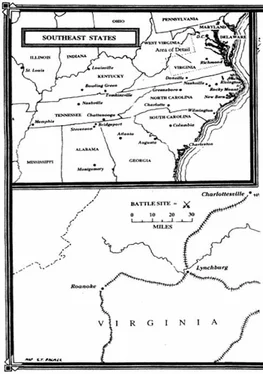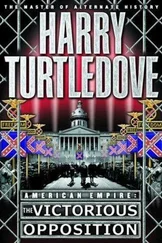Harry Turtledove - The Guns of the South
Здесь есть возможность читать онлайн «Harry Turtledove - The Guns of the South» весь текст электронной книги совершенно бесплатно (целиком полную версию без сокращений). В некоторых случаях можно слушать аудио, скачать через торрент в формате fb2 и присутствует краткое содержание. Год выпуска: 1992, ISBN: 1992, Издательство: Ballantine, Жанр: Альтернативная история, на английском языке. Описание произведения, (предисловие) а так же отзывы посетителей доступны на портале библиотеки ЛибКат.
- Название:The Guns of the South
- Автор:
- Издательство:Ballantine
- Жанр:
- Год:1992
- ISBN:0-345-38468-7
- Рейтинг книги:4 / 5. Голосов: 1
-
Избранное:Добавить в избранное
- Отзывы:
-
Ваша оценка:
- 80
- 1
- 2
- 3
- 4
- 5
The Guns of the South: краткое содержание, описание и аннотация
Предлагаем к чтению аннотацию, описание, краткое содержание или предисловие (зависит от того, что написал сам автор книги «The Guns of the South»). Если вы не нашли необходимую информацию о книге — напишите в комментариях, мы постараемся отыскать её.
The Guns of the South — читать онлайн бесплатно полную книгу (весь текст) целиком
Ниже представлен текст книги, разбитый по страницам. Система сохранения места последней прочитанной страницы, позволяет с удобством читать онлайн бесплатно книгу «The Guns of the South», без необходимости каждый раз заново искать на чём Вы остановились. Поставьте закладку, и сможете в любой момент перейти на страницу, на которой закончили чтение.
Интервал:
Закладка:
As Rhoodie had directed, he poured the contents of the packet into his cup. The stuff did not look like ground coffee. “Is this another of your desiccations?” he asked.
“You might say so, yes, General. Now if you’ll hold out your cup—” Rhoodie filled it to the brim with hot water. All at once, it smelled like coffee. “Stir it about to dissolve it all,” Rhoodie said as he filled the aides’ mugs in turn.
Lee raised the cup to his lips. It was not the best coffee he’d ever had. But coffee it unmistakably was. He took a long, slow sip, closed his eyes with pleasure. “That is most welcome,” he said. One after another, the staff officers echoed him.
“I’m glad you enjoy it,” Rhoodie said. Charles Venable had been examining his packet, too. “Instant coffee,” he said musingly.” An apt description, though not one I’ve heard before. Is this little envelope made of tinfoil, Mr. Rhoodie?”
“I think so,” the big stranger answered after a slight hesitation, which Lee believed he recognized; it sounded like the pause of a man who was not telling everything he knew. Andries Rhoodie seemed to know a fair number of things he wasn’t telling. The things he had already spoken of and shown were quite remarkable enough. Lee wondered what secrets he still kept.
Walter Taylor pointed to Rhoodie’s coffee mug. “What is that emblem your cup bears, sir, if I may ask? At first, seeing the red background and the white, I took it for a Confederate symbol, but now I see it is not.”
Rhoodie held the mug close to the fire to give Taylor a better view of it. Lee looked, too. Inside a white circle on the red background was a spiky, black emblem that reminded him of a caltrop:

Under the emblem stood three letters: AWB. Rhoodie said, “It is the sign of my organization.” He was good at appearing to answer while actually saying little.
Lee asked, “What do the initials signify?”
“Our motto,” Rhoodie replied with a smile: “America Will Break.”
Taylor raised his mug in salute. “I’ll drink to that, by God!” The other aides followed suit. So did Lee. He had stayed in the Federal army as long as he could, but when Virginia left the Union, he went with his state. It counted for more with him than did the idea of the United States.
“Another cup, gentlemen?” Rhoodie asked. “I have more coffee.”
The staff officers said yes in a chorus. Coffee won them over where even Rhoodie’s repeater had left suspicion in its wake. Lee declined: “After so long without, a second cup would surely leave me wakeful. At my age, I find I must be careful of my sleep, for I need it more but have more trouble winning it.”
Nodding to Rhoodie, he turned to go. His aides saluted. He returned the courtesy and walked slowly back to his tent. He took off his boots and jacket, lay down on the cot, and pulled several blankets over himself. Even with them, the night would be cold. Most of his men had but a single cover, many had none. The surgeons would see frostbite and catarrh come morning sick call. That happened every day.
The coffee did not keep him from falling asleep. It woke him a couple of hours later, though. He stood up to use the chamber pot. The ground chilled his toes through his socks.
Before he went back to bed, he glanced out through the tent flap. Andries Rhoodie had kept his fire large and bright. He was sitting in front of it in a folding chair of gaudy canvas webbing and wood. He did not notice Lee, being intent on the book in his lap.
“What are you reading, sir, at this late hour?” Lee called softly.
Rhoodie looked up and peered into the night. With his eyes full of firelight, he needed a few seconds to catch sight of Lee. When he did, he stuck a thumb in the book to keep his place, then shut it and held it up. A golden cross gleamed on the black cover.
“Ah,” Lee said, all at once feeling easier about Rhoodie than he had since the moment he’d met him. “You could find no better companion, by day or night. May I ask which verses you have chosen?”
“The story of Gideon,” the big ‘stranger answered. “I read it often. It seems to fit.”
“It does indeed,” Lee said. “It does indeed. Good night, sir. I hope you sleep well when you do seek your bedroll.”
“Thank you, General. A good night to you, too.”
Lee went back to bed. As he’d told Rhoodie, he often had trouble sleeping. Not tonight, though—he dropped off as smoothly and easily as a child. Just before he stopped thinking altogether, he wondered why. Maybe it was hope, something that had been in short supply since Gettysburg. He slept.
The next couple of days went by in something close to a state of anticlimax. General Samuel Jones of the Department of Western Virginia sent a letter promising cattle and beef for the Army of Northern Virginia. Lee wrote effusive thanks, but the promised animals were slower arriving than Jones‘s letter had been. As he’d feared, he had to reduce the army’s rations.
Just after he’d finished drafting the general order for the melancholy necessity, Charles Venable poked his head into the tent. “Telegram for you, sir.” He paused for dramatic effect. “It’s from Rivington.”
“Read it to me at once, Major,” Lee said.
“Yes, sir.” Venable unfolded the flimsy sheet of paper. “Stopped at Rivington northbound per your orders of January 20. Many crates of two different shapes taken on board. Townsfolk helpful and well organized. After departing, opened two crates at random, one of each type. Contents, metal cartridges and carbines of curious manufacture. A dozen men also boarded. Asbury Finch, First Lieutenant, C.S.A.”
“Well, well,” Lee said, and then again, “Well, well. Our mysterious Mr. Rhoodie does indeed have the rifles he promised, or some of them, at any rate. Despite his certainty, I wondered, I truly did.”
“I did more than wonder, sir,” Venable answered. “I doubted, and doubted strongly. But as you say, he seems to have kept the first part of his promise.”
“So he does. When General Stuart sees what these carbines can do, he will want no others. The repeaters, which ever more of the Federal cavalry employ, have hurt his troopers badly. Now he will be able to reply on equal—or better than equal—terms. And if Mr. Rhoodie was not “spinning a tale all out of moonshine, there will be rifles for our infantry as well.”
“I wonder how much the Bureau of Ordnance is paying for these—what did he call them?”
“AK-47s,” Lee supplied. “Whatever the price, it may well mark the difference between our liberty and suppression. It would be difficult to set that price too high.”
“Yes, sir.” Venable hesitated, then went on, “May I ask, sir, what you think of Mr. Rhoodie?”
“Well, I certainly think a good deal better of him now that I know for a fact he is not a solitary charlatan with a solitary, if marvelous, carbine,” Lee said at once. Then he too paused. “But that wasn’t the whole of what you asked, was it, Major?”
“No, sir.” Normally a fluent speaker, Venable seemed to be struggling to put what he thought into words: “I do believe he is the most peculiar man I’ve ever met. His carbine, his gear, even the food he eats and the coffee he drinks…I’ve not seen nor heard of their like anywhere.”
“Nor have I, and with their uniform excellence and convenience, I should hope I would have, the better to wage this war,” Lee said. “There is also more to it than that. The man knows more than he lets on. How could he have learned of my orders sending General Hoke south? That still perplexes me, and worries me no small amount as well. Had he been exposed ‘as a fraud, I would have had some hard questions to ask him about it, and asked them in as hard way as need. As is—” Lee shrugged. “He is manifestly a good Southern man. How long do you suppose we could have lasted, Major, had he chosen to go north and sell his rifles to the enemy?”
Читать дальшеИнтервал:
Закладка:
Похожие книги на «The Guns of the South»
Представляем Вашему вниманию похожие книги на «The Guns of the South» списком для выбора. Мы отобрали схожую по названию и смыслу литературу в надежде предоставить читателям больше вариантов отыскать новые, интересные, ещё непрочитанные произведения.
Обсуждение, отзывы о книге «The Guns of the South» и просто собственные мнения читателей. Оставьте ваши комментарии, напишите, что Вы думаете о произведении, его смысле или главных героях. Укажите что конкретно понравилось, а что нет, и почему Вы так считаете.












